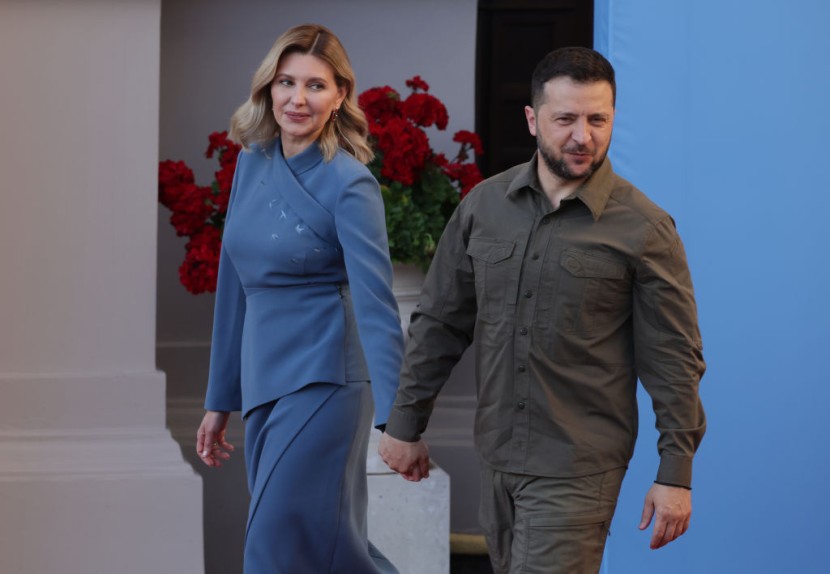
For Ukrainians, the question "How are you?" has become more than a casual conversation starter since Russia invaded their country in February 2022.
As a reflection of the way the question became a conversation starter to address one's mental health in the aftermath of the war in Ukraine, a large art exhibit called "How Are You?" was organized to feature countless works created by Ukrainian artists in the aftermath of the invasion.
The exhibit is displayed at Ukrainian House, a sprawling cultural center in Kyiv.
Art historian Halyna Hleba, one of the exhibit's curators, said the question morphed into an invitation to express how they are coping with the war.
"This question becomes like a form of love, an act of love," she was quoted saying in an NPR article. "We ask because we understand that it's a part of our inner therapy."
Hleba wrote the words stenciled into the wall at the entrance of the exhibit.
"We have changed and adapted to the realities of the war," she wrote. "Psychologists say it is required to accept the current reality of war because remaining in constant tension and states of shock and stress is counterproductive in the long run."
Zelenska's Choice of Home Front
As Ukrainian President Volodymyr Zelensky continues to lead the country's military forces in repelling the Russians in its southeast, his wife, First Lady Olena Zelenska, chose to contribute to the war effort by advocating for the mental health of those left behind at home and those returning from the frontlines.
She calls the national initiative the "How Are You?" Campaign.
"Against the background of daily alarming news, missile attacks, human grief, and trouble, it doesn't seem appropriate to ask yourself 'How are you?'" she said in a statement. "But in fact, psychological well-being and understanding of what is happening in our inner world is more timely than ever."
In a recent podcast, she said she was "pleased" with the "kind and friendly" words and tone of the program.
She also noted some Ukrainians, especially the older generation, were still wary of raising mental health issues as a result of their experience during the Soviet era. However, it is the job of younger Ukrainians to tell people about mental health care and help them understand it is not scary to seek help.
"This fear still exists," she added. "But people need to understand that it is no longer the case. It's different now."
Ukrainians Seeking Professional Help
While psychologist Oksana Korolovych commended the fact more Ukrainians are seeking professional help, it is overwhelming her and her colleagues due to countless requests for treatment.
The trauma the war brought was also personal, as she lost her husband, a military volunteer, to a Russian missile strike last year.
"Ukrainians have been living in a permanent state of bereavement for the past 18 months," Korolovych said. "When I was experiencing bereavement, I lived through the experience with other widows who also lost their husbands."
Nevertheless, she was pleased to know Ukrainians were emboldened by the way their country responded to the Russian invasion, with some of them able to shake off past feelings of helplessness.
Moving Forward
Meanwhile, Ukrainian startup Anima has expressed its intention to be of help to the "How Are You?" initiative by creating a rapid online test to screen both civilians and soldiers.
"I just wanted to bring it to the wider public and to diagnose depression and anxiety as widespread problems," Anima co-founder Roman Havrysh said.
Anima's online test has been used for several months to help screen Ukrainian troops in one of the battalions the company selected for a trial. During that time, 40 of the 600 soldiers were temporarily taken out of combat roles.
Most returned after several days, though a few were reassigned to non-combat positions.
Anima co-founder and neuroscientist Sergiy Danylov said soldiers needed an elevated level of vigilance while in combat. However, they could not be in this state for a long time as they could become vulnerable to an anxiety disorder.
"When they return home, two or three months later they may start having panic attacks," he added.
The Ukrainian military is also organizing peer-to-peer discussions about their experiences after they went through a combat rotation. Military psychologist Dr. Vladyslav Syniagovsky said soldiers would need to undergo decompression or debriefing after an intense battle, such as Bakhmut or Kherson.
He said preliminary data suggest around 15% of Ukrainian troops suffer from post-traumatic stress disorder (PTSD), a figure roughly in line with studies of US troops who served in Iraq and Afghanistan.
"Inside of this group, we are discussing the most traumatic events during battle," he added. "We found a lot that is very useful for mental health. It's a first step for treatment and for healing."
Related Article: US Suicide Deaths in 2022 Reach All-Time High, CDC Data Finds
© 2026 HNGN, All rights reserved. Do not reproduce without permission.








